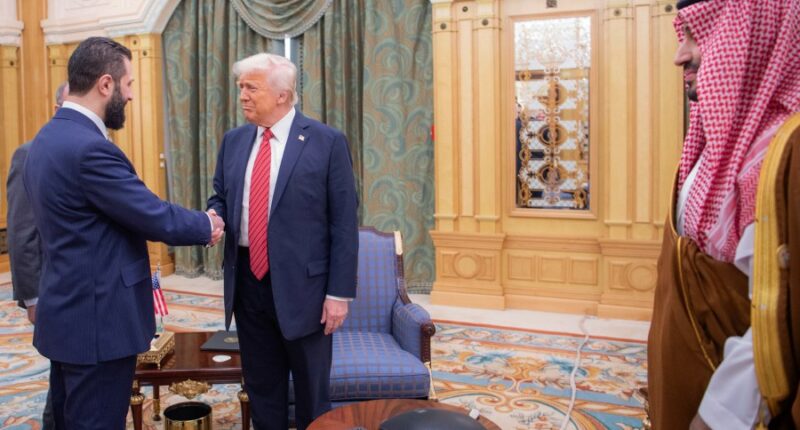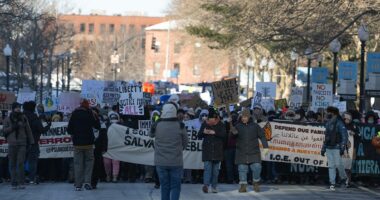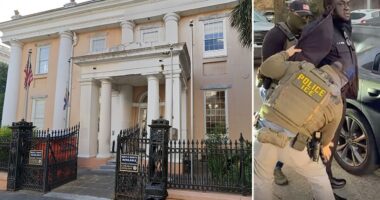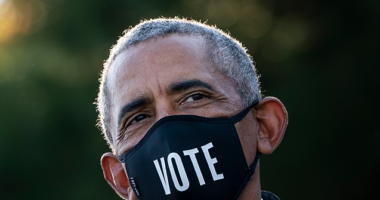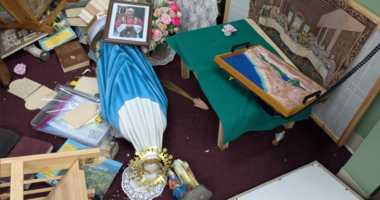Share this @internewscast.com

In a significant diplomatic development, the United Nations Security Council voted on Thursday to lift a set of sanctions against Syrian President Ahmad al-Sharaa and key members of his government. This decision comes shortly before al-Sharaa is scheduled to visit the United States for a landmark meeting at the White House.
The resolution, initiated by the United States, aimed to remove U.N. sanctions previously imposed on al-Sharaa and Syria’s interior minister, Anas Hasan Khattab, due to their associations with the al-Qaida militant group. Garnering support from 14 council members, the resolution passed smoothly, though China chose to abstain from the vote.
U.S. Ambassador to the U.N., Mike Waltz, hailed the resolution’s passage as a potent political statement, acknowledging a transformative period for Syria following the ousting of Bashar Assad and his regime in December 2024. “With the adoption of this text, the council is sending a strong political signal that recognizes Syria is in a new era since Assad and his associates were toppled,” Waltz declared post-vote.
The United States pushed to finalize the resolution ahead of President Donald Trump’s scheduled meeting with al-Sharaa. This engagement marks the first time a Syrian president will visit Washington since Syria achieved independence in 1946, underscoring the historical significance of the event.
In response to the vote, Syria’s foreign ministry expressed approval, stating the near-universal endorsement symbolizes a growing confidence in President al-Sharaa’s leadership. They described the move as a triumph for Syrian diplomacy, emphasizing its success in re-establishing Syria’s international status and regional influence.
However, not all members were convinced. Chinese Ambassador to the U.N., Fu Cong, voiced reservations, emphasizing China’s support for the Syrian people but criticizing the U.S. resolution for failing to adequately consider the “legitimate concerns of all parties” regarding counterterrorism and security issues in Syria.
“The sponsor did not fully heed the views of all members and forced the council to take action even when there were huge differences among council members in an attempt to serve its own political agenda,” he said.
While al-Sharaa is in Washington, Syria is expected to join the U.S.-led anti-Islamic State coalition, which includes some 80 countries working to prevent a resurgence of the militant group.
The effort is part of Trump’s strategy to rebuild relations with Syria after the 50-year rule of the Assad family came to an end in a lightning offensive led by al-Sharaa. Assad’s fall also brought to an end nearly 14 years of civil war.
Since then, al-Sharaa has sought to restore ties with Arab countries and the West, where officials were initially wary of his past ties to al-Qaida. The rebel group he formerly led, Hayat Tahrir al-Sham, was previously designated by the U.S. as a terrorist group.
Trump met al-Sharaa in Saudi Arabia in May and made good on a pledge to lift or waive decades of sanctions against the war-torn country.
However, the most stringent sanctions were imposed by Congress under the Caesar Syria Civilian Protection Act in 2019 and will require a congressional vote to remove them permanently.
In a bipartisan statement, the top Democrat and Republican on the Senate Foreign Relations Committee welcomed the U.N. action Thursday and said it was now Congress’ turn to act to “bring the Syrian economy into the 21st century.”
We “are actively working with the administration and our colleagues in Congress to repeal Caesar sanctions,” Sens. Jim Risch and Jeanne Shaheen said in a statement ahead of the vote. “It’s time to prioritize reconstruction, stability, and a path forward rather than isolation that only deepens hardship for Syrians.”
Syria’s conflict broke out in early 2011 and left nearly half a million people dead and millions displaced, including many who are now refugees. The war caused widespread destruction, and Syria will need tens of billions of dollars to rebuild.
___
Associated Press writer Abby Sewell in Beirut contributed to this report.
